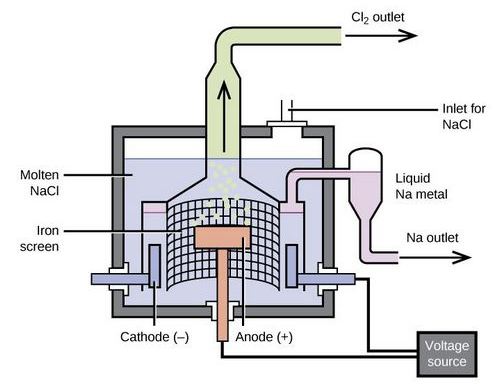May 10, 2023 - No. 25
All Out to Uphold the Dignity of Labour!
As Windsor Salt Strike Enters Week 13 Support Grows in Face of Company's Dirty Tricks

Unifor Local 598 retirees from Sudbury bring their support to salt workers' picket lines, April 30, 2023.
• Company Gives Spurious Reasons for Not Negotiating
• New York Salt Miners' Contract Expires May 31
New Breakthroughs Using Sodium for Electric Batteries
• Control Over Canada's Critical Mineral Resources
• Sodium-Ion Batteries vs Lithium-Ion Batteries
• Strategic Sources of Sodium in North America
All Out to Uphold the Dignity of Labour!
As Windsor Salt Strike Enters Week 13 Support Grows in Face of Company's Dirty Tricks

May Day rally at Windsor Salt picket line.
Workers in Windsor-Essex and beyond continue to express their support in concrete ways for the workers on strike at Windsor Salt in Windsor, Ontario. The salt workers have been on strike since February 17 in defence of the claims they are entitled to make, especially the contracting out of their jobs to non-union labour. Windsor Salt's owners, U.S. based-Stone Canyon Industries Holdings Inc. are known for union-busting and their tactics in this strike are in that direction. The support continues to broaden and grow because the workers' cause is just and upholds the dignity of the labour movement itself, not just in Canada but in the United States as well. In the U.S., workers are waging unprecedented battles against attempts to break unions and make unionizing impossible for the majority of workers. Meanwhile, the company has not even come to the negotiating table in Windsor since April 27.
Active and retired workers have been visiting the picket line from as far away as Sudbury, Oshawa, Toronto, Hamilton and elsewhere to show their support for the workers and also support them financially so that they can sustain their strike. Teachers in Ontario continue to raise the demand with their pension fund that their retirement savings not be used to finance Stone Canyon to carry out its anti-social anti-union activities.[1]


Retirees
from Sudbury Mine/Mill of Unifor Local 598 (left)
visit and
bring financial support and members of OPSEU Local 143 bring
their support.
On April 29 and May 1 rallies were held at the picket line where many contingents of the labour movement in Windsor and Essex County came out to support the workers. On April 29 a beautiful mural was unveiled painted by two local artists as an expression of their support for the workers. It includes a panel where everyone is encouraged to come down to the line and sign their name to show they stand with the workers in this fight. To see the video of the unveiling click here.
On May Day a large rally organized by the Windsor and District Labour Council was attended by broad contingents of the labour movement as well as students from the university.[2]
The response of the community is showing the company that its dirty tricks are not working to break the support for the workers or their morale. Far from it, more and more people can see for themselves what the workers are fighting for and why it is important that they hold the line and they are stepping up their support to lend a hand.

May Day rally, Windsor Salt picket lines.
Notes
Company Gives Spurious Reasons for
Not Negotiating
Stone Canyon Industries Holdings Inc., the company which owns Windsor Salt, is giving spurious reasons for why it is staying away from the negotiating table. On April 27 it issued a statement saying that "at approximately midnight last night, three masked individuals armed with baseball bats unlawfully entered the Company's Ojibway mine facility. The armed trespassers brutally ambushed one of Windsor Salt's employees, striking him repeatedly with the bats." The company is offering $50,000 "for anyone who brings information to the police that leads to the arrest and prosecution of the attackers."
The company presented no evidence which implicates the union or
substantial information on the alleged attack. From what the workers
know, any police investigation is closed with no charges having been
laid. It has also come to light that the manager in question was taken
to hospital and released shortly after without much ado. The workers
have rejected the company's methods of insinuating the union had
anything to do with let alone that it warranted halting negotiations
while the company investigates the incident. The company said in its
statement that it "intends to focus its efforts on identifying the
perpetrators and anyone who acted in concert with them."
Since then workers are informed that a firm of private investigators who the workers say are retired Toronto Police officers has been hired by nobody knows who to visit workers' homes to question them one-by-one and remind them about the $50,000 reward for information. Meanwhile no negotiations have taken place since.[1] The workers have informed themselves of their rights and are 1) asking who gave these private investigators the private information of where they live, which is against the law on the workers' privacy rights, and 2) not talking to them.
Besides this development, the police arrested and criminally charged 12 striking workers and a representative of Unifor national for disobeying a court order. The workers were arrested for blocking trucks on April 11 from entering the evaporation facility for four hours, which is beyond the injunction's permitted 15 minutes. On that day, federal NDP leader Jagmeet Singh visited the lines and the company broke off negotiations, arrogantly declaring it needed time so that it could train its managers in Mine Rescue to keep production going during the strike. The workers blocked any movement of trucks in or out of the plant for four hours. Despite hundreds of workers being present that day, 13 were singled out and charged. As conditions of their release, these workers are not legally permitted to be within 600 metres of the picket line which prevents them from doing their strike duties. They have been given court dates for their charges.
While the company can keep workers out on strike for weeks by delaying negotiations on whatever arbitrary grounds it pleases to randomly announce, there is no demand by the courts to require the company to negotiate! In response, the workers continue to hold the line 24/7. All those who can are encouraged to visit the lines as much as they can and to provide financial support to Unifor Locals 1959 and 240 which represent the workers in the mine and evaporation plant and clerical staff.

Striking public service workers bring their support to Windsor
Salt picket line April 27, 2023.
Note
1. "Comment on Windsor Salt Ltd. Public Statement," EmpowerYourselfNow.ca, April 27, 2023.
New York Salt Miners' Contract Expires May 31
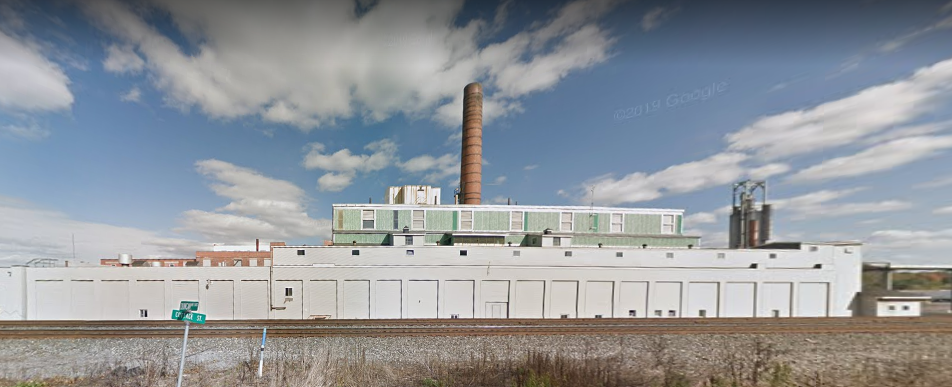
Morton Salt plant in Silver Springs, New York
The contract for workers at the Stone Canyon Industries Holdings Inc. (SCIH) Morton Salt facility in Silver Springs, New York will expire on May 31. The plant is another salt evaporation facility owned by SCIH where no contract has yet been agreed to with their unionized workforce. The workers are represented by United Steelworkers of America Local 625.
The Silver Springs plant has roughly 150 workers and produces salt from brine wells. The working class of Silver Springs has been extracting salt at the facility for 139 years. Silver Springs, New York has a population of fewer than 900 people and as a result, everyone there is connected to Morton Salt -- either because they work there, used to work there, know someone who works there or know someone who used to work there -- according to a previous Mayor of the town. Morton Salt is the largest employer in or near the town and draws workers from a 20-mile (32km) radius, reaching deeper into Wyoming County and into neighbouring Allegany County.
The plant produces block salt for farm animals, pellets for water softening, and table salt. They co-pack Kosher salt from Ohio and Kansas. Table salt accounts for two-thirds of what is made at the plant. According to reports online, wages for general labour at the facility start at USD$21.38, increasing to USD$24.90 upon completion of a 90-day probationary period.
Brine extraction in Silver Springs, New York began in 1884 when the Duncan Salt Co. was established. It was bought by the Worcester Salt Co. around the turn of the 20th century, and has continued operations since Morton Salt bought it in 1944.
Since purchasing Morton Salt in 2021, SCIH have used their monopoly on salt production to attack workers' unions and standards in both Canada and the United States. The workers harbour no doubt that they would like to continue this trend in Silver Springs. At this time, workers at Windsor Salt's evaporation facility in Windsor, Ontario are on strike and no significant production at the plant has been possible since the strike began on February 17. This means that SCIH could have two evaporation plants offline if they try to impose conditions on the U.S. workers' union in Silver Springs and the union refuses to submit and goes on strike.
The experience of Canadian workers shows that the company makes its plans to provoke a strike well in advance and its "offers" are a setup. The company may also try to use intimidation to get the workers at Silver Springs to accept something. But the workers have their own outlook on such matters based on more than a century of experience of dealing with union-busting and police powers deployed by employers and governments in all sectors of the economy. The company is in fact vulnerable to united action from the working class of Canada and the U.S. if they are able to stand as one in defence of their rights. In this respect, the workers on both sides of the border are on the lookout for company attempts to pit one section of the workers against the other to undermine them both. With this in mind, they can work out what will favour the labour movement as a whole in North America and give confidence that workers cannot just be disposed of, pitted against one another and that their collective No! to union busting means No!
The salt workers in Windsor have now maintained their resistance for 12 weeks in the face of all kinds of dirty tricks. Their fight in defence of their just claims in the contract negotiations has exposed the tactics of the company and brought forward more and more support from working people in the Windsor-Essex area and farther afield. This contributes to the general experience of the workers' movement, especially those who work for unscrupulous companies like Stone Canyon Industries Holdings Inc.
(EmpowerYourselfNow.ca. Photo: EYN)
New Breakthroughs Using Sodium for Electric Batteries
Control Over Canada's Critical Mineral Resources

Mural of Salt plant in Windsor painted by local artists in
support of striking workers.
There is quite a bit of discussion in industry papers of new breakthroughs using sodium for electric batteries. Huge salt deposits exist in Canada, with some of the most important ones being the Goderich and Ojibway salt mines located in southwestern Ontario. The Goderich mine is owned by Kansas-based Compass Minerals, while the Ojibway Windsor Salt mine in Windsor, Ontario, and a similar mine in Detroit, Michigan across from Windsor are owned by California-based Stone Canyon Industries Holdings Inc. (SCIH).
SCIH became the biggest owner of salt capacity in North America after it bought Morton Salt, which owned Windsor Salt, in 2021 in part using investments from the Ontario Teachers' Pension Plan. It has been engaged in restructuring its salt business by closing production in Alberta and attacking workers' unions. Workers at its Ojibway mine and evaporation plant have been on strike since February 17 in defence of their demands against a company drive to increase contracting out to non-union labour.
Of note is that since Stone Canyon purchased both the Ojibway mine and evaporation facility, it has expanded their productive capacity by adding a new level to the mine and new brine wells for evaporated salt. The Windsor Salt facilities currently on strike in Windsor, Ontario sit almost halfway between the future Clarios Meadowbrook sodium-ion battery plant in Michigan and a soon to be built Volkswagen battery plant in St. Thomas, Ontario which is also being financed by the Canadian government.[1]
This means that SCIH is now in control of a valuable source of Canadian salt, set to become even more valuable given its role in electrification. It adds a whole new dimension to company attempts to impose contracting out in the current contract the workers are trying to negotiate at Windsor Salt. Contracting jobs out to non-union labour will ipso facto weaken the workers' defence organization, their union, and this will increase health and safety concerns, put downward pressure on union wages and be used to cause acrimony within the ranks of the work force.
With the support of governments at all levels and subsidies through pay-the-rich schemes said to be good for prosperity, stability and security, profits will increase. The expanded demand for salt and the expanded productive capacity at the Windsor Salt mine is crucial to the success of these schemes. Thus, the fight of workers to claim what is theirs by right and defend their union and right to negotiate a new collective agreement without having to deal with the company impunity is a fight which upholds the right of all workers and of Canada itself for a nation-building project which ensures that the value from this Canadian natural resource benefits Canada and is not ripped out of the country to pay dividends to SCIH's owners.
Note
1. See "Problems with "Green Energy" Projects – Massive New Subsidy for Volkswagen Battery Facility to be Built in St. Thomas, Ontario," TML Monthly, April 2023.
Sodium-Ion Batteries vs Lithium-Ion Batteries
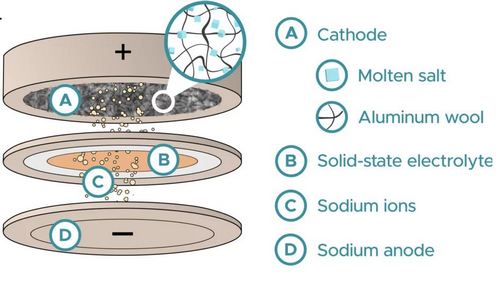 Sodium-ion
batteries (NIBs) are an emerging alternative to traditional
lithium-ion
batteries (LIBs) currently used in most electric vehicles (EVs).
Reports indicate they have the potential to be safer and more
environmentally friendly as they do not contain toxic or
flammable
materials.
While LIBs are known for their high energy density and
relatively long
lifespan, they have several drawbacks. This includes high cost,
environmental concerns and limited availability of key materials
such
as cobalt, nickel, and manganese. In some NIB designs, copper as
a
current collector is
replaced by aluminum, a cheaper and more abundant metal (see graphic).
Sodium-ion
batteries (NIBs) are an emerging alternative to traditional
lithium-ion
batteries (LIBs) currently used in most electric vehicles (EVs).
Reports indicate they have the potential to be safer and more
environmentally friendly as they do not contain toxic or
flammable
materials.
While LIBs are known for their high energy density and
relatively long
lifespan, they have several drawbacks. This includes high cost,
environmental concerns and limited availability of key materials
such
as cobalt, nickel, and manganese. In some NIB designs, copper as
a
current collector is
replaced by aluminum, a cheaper and more abundant metal (see graphic).
Over the last few years, scientists at the Central South University in Changsa, China have been developing NIBs as an alternative to LIBs. Chinese battery maker Hina and Sehol -- a joint venture brand of Anhui Jianghuai Automobile Group Corp (JAC) and Volkswagen Anhui -- have together built a test vehicle with NIBs, based on the latter's Sehol E10X model. "The sodium-ion battery technology and performance could be used in mid-to large-sized EVs as it matures further," a Hina executive is quoted as saying.
According to JAC, its new EV is equipped with a 53.6 kilowatt hour (kWh) NIB pack that provides a range of up to 500 kilometres (km) on a single charge. The battery can be fast-charged to 80 per cent capacity in just one hour. JAC also highlighted that NIBs can operate under extreme weather conditions, from minus 40 degrees Celsius to plus 70 degrees Celsius. LIBs cannot do this, which is another one of their drawbacks.
In a recent article published in the New York Times, we read that "sodium, found all over the world as part of salt, sells for one to three per cent of the price of lithium and is chemically very similar. Recent breakthroughs mean that sodium batteries can now be recharged daily for years, chipping away at a key advantage of lithium batteries. The energy capacity of sodium batteries has also increased. And sodium batteries come with a big advantage: They keep almost all of their charge when temperatures fall far below freezing, something lithium batteries typically do not do."[1]
The ability to use sodium from salt is significant given that one of the major issues in the transition to electric vehicles and electrification in general is the cost of batteries and their functioning in harsh environments. If the global auto monopolies, especially, can reduce the cost of the batteries using public subsidies and salt rather than lithium, as well as cut back their work force significantly because electric vehicles require far less parts, they stand to make more profit.[2]
The world's largest manufacturer of electric car batteries is Chinese manufacturer CATL. It will soon be opening a base for the production of NIBs called Cheliwan Production Base in Ningde, central China. CATL is also very much involved in manufacturing rechargeable batteries for mass power storage in China. At this time the company has developed technology to pair LIB packs with NIBs in what it calls its AB battery pack. This battery pack has the ability to support EV ranges of up to 500 kilometres, said Huang Qisen, vice president of CATL Research Institute, at a November 2022 forum. With its AB battery system CATL has achieved a mix of the two types of electric batteries, allowing them to complement each other and thus increase the energy density of the battery system. NIBs are less energy dense than LIBs which essentially means more mass is required to get the same energy capacity and this increases the weight and space requirements. By mixing the two types of batteries, CATL is able to get the benefits of each type in one pack.
In two years, China will have nearly 95 per cent of the world's capacity to produce NIBs. Out of 20 NIB factories now planned or already under construction around the world, 16 are in China, the consulting firm Benchmark Minerals informs. Although LIB production will still dominate the rechargeable battery market at that point, advances in sodium are accelerating, Benchmark Minerals says. Companies in North America are trying to catch up.
In a May 4, 2022 press release, U.S.-based NIB designers Natron Energy and Clarios International, "a subsidiary of Brookfield Business Partners," announced that they are in a race to outdo Chinese giant manufacturer CATL. They are collaborating to set up what they called the "World's First Mass Manufacturing of Sodium-Ion Batteries."[3]
The Natron-Clarios NIB producing plant will be located at the Clarios Meadowbrook facility which already produces LIBs. The Natron-Clarios plant is in Holland, Michigan, U.S. Natron says that the similarity in manufacturing requirements allows the two companies to use part of Clarios' lithium-ion facility for sodium-ion production. This is expected to result in lower costs and faster time to market compared to building a new factory. The project to retool the existing plant is being financed by the U.S. Department of Energy's Advanced Research Projects Agency (ARPA-E) through the Seeding Critical Advances for Leading Energy Technologies With Untapped Potential Program (SCALEUP).
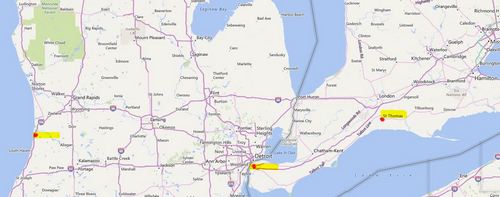 Map
showing location (highlighted in yellow) of Natron-Clarios
sodium-ion
battery plant in Holland, Michigan (left), the Ojibway salt mine
in
Windsor, Ontario (centre) and the Volkswagen battery plant in
St.Thomas, Ontario (right).
Map
showing location (highlighted in yellow) of Natron-Clarios
sodium-ion
battery plant in Holland, Michigan (left), the Ojibway salt mine
in
Windsor, Ontario (centre) and the Volkswagen battery plant in
St.Thomas, Ontario (right).
Notes
1. "Why China Could Dominate the Next Big Advance in Batteries," Keith Bradsher," New York Times, April 12, 2023.
2. Governments at All Levels Paying for Large-Scale Changes in Auto Industry, Enver Villamizar, Workers Forum, February 16, 2023.
3. In an article entitled "McGuinty Opens Space for Brookfield Vultures," in the March 6, 2012 issue of Ontario Political Forum, Jim Nugent had this to say about Brookfield:
"Brookfield is an aggressive international monopoly based in Toronto and New York. It is notorious amongst Canadian workers for its wrecking of productive enterprises, causing job losses and looting workers' pension plans. Brookfield was instrumental in wrecking Stelco and handing this national treasure over to U.S. Steel. It has specialized in shuttering paper mills and saw mills in the Maritimes, in Quebec and across the country to steal the power from the hydro plants connected to the mills and helping finance their big scores by looting pension plans of the workers they throw on the street.
"Now Brookfield is expanding rapidly into the Ontario public hydro sector to occupy the private sector space created by [Mike] Harris and [Dalton] McGuinty. Linking up with Hydro One on the EWT [East-West Tie] power distribution project will serve Brookfield's strategy of becoming a dominant global force in renewable power generation. A week before the bid for the EWT project was submitted, Brookfield consolidated all of its electricity holdings into one company, Brookfield Renewable Energy Partners, to prepare for competing in Canadian and global markets."
(With files from TML, New York Times, Brighter Side of News, CNEVPost, Benchmark Minerals, U.S. Department of Energy, Natron Energy, Clarios International. Photos: Unifor Local 240)
Strategic Sources of Sodium in North America
Rock salt, also known as the mineral halite, and soda ash, known as the mineral trona, are the two main sources of sodium in North America. An industrial process to extract the sodium metal from rock salt was invented in the 1920s. It is known as the Down's process. The main part of that process is an electrolysis of molten salt that separates its two main ingredients: sodium and chlorine. A special apparatus called a Down's cell is used and consists of a rectangular container of steel in which sodium (Na) and chlorine (Cl) are separated from the fused salt through an electrochemical reaction at high temperature.
As for soda ash, which is a form of sodium carbonate, it is mainly mined in the Green River Basin, in southwest Wyoming, in the form of a mineral known as trona. The Green River Basin, where four major mines operate, is home to the world's largest reserves of trona ore.[1]
The distance between the soda ash mines in Wyoming in relation to the future sodium-ion plant in Holland, Michigan (2,200 kilometres) places the Green River Basin operators at a disadvantage when compared with the location of the Windsor salt mine which is only 300 kilometres away from the Michigan battery plant and 180 kilometres from the St. Thomas Volkswagen battery plant, almost 10 times closer in distance (see map below). The Goderich salt mine is also close, some 450 km from Holland and 132 km from St. Thomas, however Goderich does not have a deepwater port which makes transportation of rock salt by boat more difficult. The entire Michigan-Ontario area is also serviced by major highways, railway lines and shipping lanes connecting St. Thomas and Holland to Windsor. The Windsor Salt mine in particular has a deep port capable of loading ships with 30,000 tons of rock salt which can be moved on Lake Huron to Lake Michigan to get to the Holland Michigan facility or St. Thomas facility that is being built, not to mention the new LG/Stellantis battery plant which is under construction in Windsor itself.
 Location
map of soda ash mines in Wyoming (left), Natron-Clarios
sodium-ion
plant in Michigan (centre-right) and Ojibway salt mine in
Windsor,
Ontario (right).
Location
map of soda ash mines in Wyoming (left), Natron-Clarios
sodium-ion
plant in Michigan (centre-right) and Ojibway salt mine in
Windsor,
Ontario (right).
The demand of the workers of Canada and the U.S. that electrification serve the people and the protection of the natural environment is the biggest factor for ensuring that the advances in technology which are taking place at this time are put at the disposal of humanizing both the natural and social environment. In this respect, the strike of Windsor Salt workers in Windsor, Ontario in defence of their union and its standards represents a line in the sand drawn by Canadian workers who say critical mineral resources should be extracted in a sustainable manner which upholds the health, safety and dignity of the workers and contributes to the well-being of the people and the environment.
The potential for salt to be used in the production of electric batteries rather than lithium which is much harder to mine is a positive development. The workers in both the U.S. and Canada will make a big contribution by arguing out how this resource can be developed and under whose control so that it can be put at the disposal of nation-building rather than destroying the standards workers have given rise to in the mining sector.
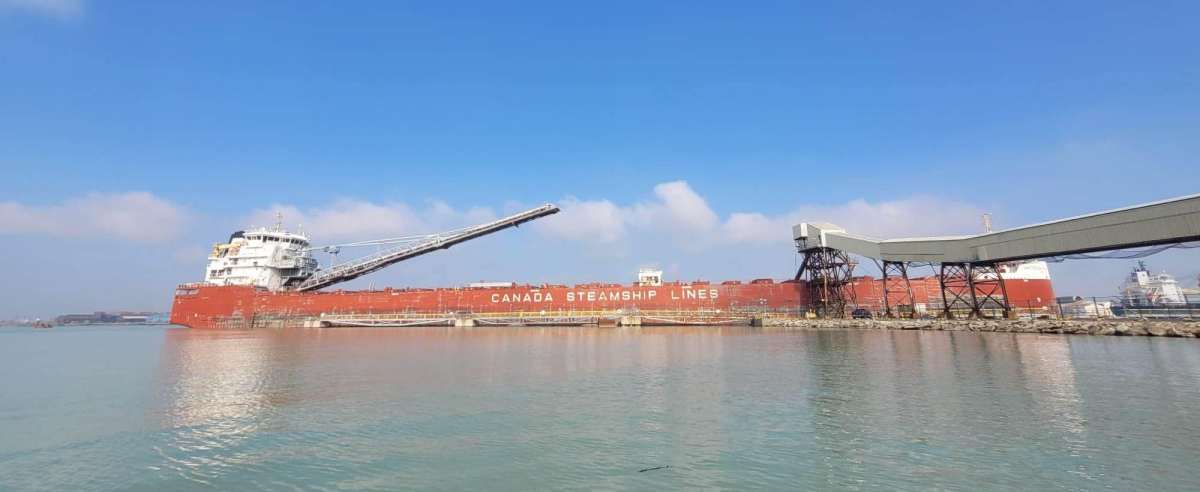
Salt being removed from Windsor Salt by strikebreakers during
salt workers' fight to defend their rights.
Note
1. The four major mining companies that extract trona ore in Wyoming produced about 11.1 million tons of soda ash in 2005. They are:
- Genesisalkali, owned by Genesis Energy based in Houston Texas, which produces annually 3.6 million metric tons of soda ash and derivative products for different forms of glass.
- Sisecam Wyoming, owned by Sisecam, a conglomerate of companies based in Turkey, which also has operations in the Balkans and the United States. It mainly specializes in the production of varieties of glass products made from soda ash, but is also involved in the electrical energy sector and natural gas market in Turkey. Its website notes that "Sisecam is the world's second largest producer of soda ash." At present, its U.S. operations have a total annual production capacity of 5 million tons that is expected to increase to 10 million tons through a 2021 buyout of Ciner Resources.
- Solvay Chemicals, owned by Solvay S.A., is a chemical manufacturing conglomerate based out of Brussels, Belgium that specializes in thermoplastic composites applied to the automotive and aerospace industries. Its U.S. production of soda ash and derivative products is geared mostly towards the glass and chemical industries, the food processing and pharmaceutical sectors, as well as in livestock feed. It began production in 2021.
- Tata Chemicals Soda Ash Partners, owned by the Indian comglomerate monopoly Tata, that operates a mine in the Green River area in Wyoming, with more than 4.5 million tonnes per year of trona ore that is processed into soda ash at its surface refining plant.
(To access articles individually click on the black headline.)
Website: www.cpcml.ca Email: editor@cpcml.ca



